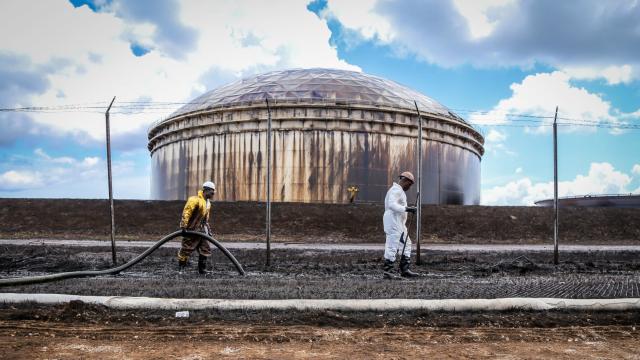Our weather is becoming more extreme, litigation is targeting fossil fuel companies”and our whole economic system is at risk of imploding if the energy sector doesn’t prepare for climate change, financial experts warn.
In a series of commentaries published in Nature Energy on Monday, experts shared their concern for what extreme heat, stronger hurricanes, and worse wildfire seasons could mean for the global economy, which is so deeply connected with the energy sector. Currently, the market doesn’t factor these weather events when it considers the value of energy firms and the fossil fuels they’re selling. That shows both how the economy is bound up in fossil fuels and the danger that poses as burning those very fuels makes the climate crisis worse.
Fossil fuels will have to be wound down rapidly in the next decade to avoid an even more unstable climate. That could mean up to $US4 ($6) trillion in stranded fossil fuel assets. But the new commentaries point to the need to think about the risks facing fossil fuels today and how those could have knock on effects on the global economy.
“In large part, you’ve got this risk element,” Paul Griffin, a distinguished professor at the University of California, Davis’ Graduate School of Management and a commentary author, told Earther. “The main takeaway based on not just my work but other work, as well, is that this risk is not fully priced, so it is yet to be revealed to markets.”
By the time that risk becomes clear to energy companies and the banking institutions that invest in them, the industry could suffer tremendously. I don’t care much for individual fossil fuel companies, but a major hit to them would mean severe disruption for the rest of us given the nature of our global economy.
Big Oil and other companies have entrenched interests in preserving the status quo, and so far, that’s been their tack. Oil and gas giants are trying to shift public perception around their contribution to the climate crisis through bogus advertisements and weak climate pledges, but none so far are willing to take real action.
“If things are working, and they’re making money, why change it?” Kenneth Gillingham, an associate professor of economics at Yale University, told Earther. “Anything that is a change requires real effort, requires potentially cuts to their profits, and so if it seems to be working, why change it?”
Several events could trigger a mass awakening to the risks the energy industry faces as it continues to invest in oil and gas. One that is more lawsuits. The fossil fuel industry has target of states and cities looking for financial aid to prepare their regions for the climate crisis. Their argument? The public should not have to foot the bill for a problem the fossil fuel industry knowingly created and then continued to deny.
So far, fossil fuel companies have won the cases against them or gotten them tossed out. If plaintiffs ever succeed, though, that could be a game-changer for the industry at large. That’s because more targeted lawsuits are sure to follow once this proves to be an effective strategy against these energy firms.
“Those court activities, which are in process right now, could shift in the direction of favouring the plaintiffs in these cases, so that could lay on the energy sector quite a substantial litigation liability,” Griffin said.
This would be great for plaintiffs and the planet at large, but the economy could suffer if these changes happen overnight. Remember the housing bubble that triggered the Great Recession of 2008? Griffin imagines another recession could happen if things go down this way.
Lawsuits are just one disruption that could push the market to correct for the true risk that comes with investing in oil and gas. Griffin also lists the possibility of fossil fuel infrastructure in the Gulf Coast suffering damage from a storm or, as we saw already happen in California last year with PG&E, when utilities conduct massive blackouts to protect the public from extreme threats like wildfires.
All this negative attention around wildfires and the utility’s contribution pushed PG&E to file for bankruptcy, and there are risks of even more disruption around the corner as the climate crisis increasing the odds of intense storms and more explosive wildfires.
Energy companies and their investors are becoming aware of this issue, but the market is slow to reflect this growing awareness. Goldman Sachs has taken steps to stop funding oil and gas infrastructure in the Arctic.
Major asset manager Blackrock is also taking steps to stop funding risky fossil fuel ventures. The goal is that this all helps the industry wind down as the world transitions toward a clean energy economy. But there’s a long way to go for the market to reflect the true dangers of fossil fuel investments.
The longer the market ignores the risks, the greater the odds of a harsher shock. If this is what transforms the economy”and not, say, a Green New Deal”families around the world will likely suffer economic hardship at a time when we have a change for a transition full of hope and prosperity for all.
